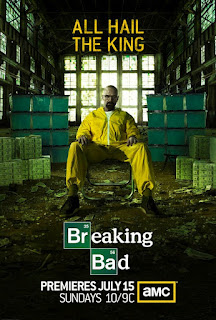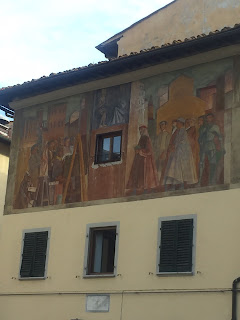Breaking Bad* - The Friction between Determinism and Free Will
I've never been one to get real geeked out about a TV
series. I didn’t really follow the Sopranos, 24 or Mad Men. But Breaking
Bad captured my imagination from the first episode. As a writer, I was amazed by how good the
premise is and how well the storyline set up some real high stakes drama. If you’re unfamiliar with the show, it’s
about Walter White (Brian Cranston; played the dad on Malcolm in the Middle), a high school chemistry teacher struggling
to support his family on his public school salary who finds out he’s got
terminal lung cancer. He decides to put
his chemistry expertise to use by manufacturing methamphetamines to make enough
money to pay for his kids’ college educations and pay off the mortgage on his
house before he dies. He forms an
alliance with a former “F” student of his, Jesse Pinkman (Aaron Paul), to start
manufacturing meth and making fat stacks of cash. The brainiac fifty-year-old school teacher and
the dropout meth-head make a natural Don Quixote and Sancho Panza, which sets
up some great dialogue, misunderstandings and built-in tension.
After missing the first couple of seasons Margaret and I
caught a couple of episodes and then went back and caught up on the whole
series on DVD. The fourth season is
about to be made available (June 5th I think) and then the fifth
(and supposedly final) season starts in mid-July. I was fascinated by the show from the very first episode because it's so well done. Even the minor characters
who initially seem to be stock characters like the DEA agent and the scumbag
lawyer turn out to be really complex, interesting and entertaining. And just when you think, “OK, I know what’s
going to happen here,” the show’s creator and writers really shock you. What I didn't like about it was that it
initially seemed to be a big commercial for determinism. Determinism is the theory that would have us
believe that we don’t really make decisions; they’re all pre-set for us by our
situations and conditions. A deterministic thinker would say, “See, Walter White has no choice but to cook meth. His low salary, crappy health plan, family
situation and terminal disease make the decision inevitable.”
Like most theories, determinism has points in its
favor. For example, I do believe that,
to a certain degree, there are some real boundaries on what you can and can’t
accomplish based on where you are and what’s around you. If you’re born into a Bora Indian tribe on
the Amazon River and live with them until you’re thirty, you’re not going to play
the cello like Yoyo Ma. Sorry, your
environment just didn’t set you up for that.
Conversely, for me to be born white, male and healthy in a loving and
economically stable family in the United States has made the range of
opportunities for me just about unlimited (it bummed me out, though, when I was nine years old and realized I’d never play for the Harlem Globetrotters). But I also made some decisions by my own free
will, like joining the Marine Corps and staying in for twenty years, learning
Spanish and pursuing assignments to Latin America, decisions which were in no way
inevitable or unavoidable.
The more you follow Breaking
Bad, though, the more you see the protagonist making some decisions that
pull him further and further into the lethal vortex of the drug business. Aristotle’s Poetics (written about 330 b.c. I think), maybe the first essay on
literary theory, talks about how literature (theater or epic poetry in his day)
mimics real life to give the spectator/reader/hearer the opportunity to see a
believably real-life character in something approximating a real-life scenario
so that we can see the effects of their moral decisions and wonder how we would
act in a similar situation, and the show is so believable you can’t help but
hang on just about every turn of every episode.
To be sure, you can’t just start making meth and selling it
without generating some serious trouble with both good guys and bad guys and
trouble comes looking for Walter and Jesse as soon as they start
manufacturing. Many of the problems that
they face just come with the territory of their initial bad decision. But if you pay close attention to Walter
White, you see him make decisions that keep him in the game – a game in which, up
until the end of the fourth season, only Walter, Jesse and one hired gun are
still standing. Walter’s decision to
make a time-critical meth delivery instead of taking his wife to the hospital
to give birth to their daughter is one such point of no return. His reaction when he finds out his cancer is
in remission (in addition to some other things he says and does) reveals the strong
presence of what Freud called the “Death Drive” in Beyond the Pleasure Principle.
I know it wouldn’t make much of a series if Walt just rolled
over and quit, but I believe the show latches onto some key points of real
life. When I worked in Miami at SOUTHCOM
we were concerned about these Central American gangs like Mara Salvatrucha and
Calle 18. They were not only generating
an incredible amount of violence in Central America, but would move to
Washington, DC or Los Angeles and be just as active and violent. Prison in the U.S. wasn’t a deterrent for these
guys: it was like giving them a scholarship to Gang University. In trying to figure out what drove these guys
to do what they did (the typical template was to follow the money to the
criminals) we eventually found out that they weren't in it for the money. They slept on a mattress on the floor in
crack houses and wore the same clothes for days on end. And when the high-level guys stopped shaving
their heads and stopped getting all tatted up they became extremely hard to
find and track, because most of them eschewed the indicators of wealth. They didn’t care about the money; they wanted
to matter; they wanted to be somebody
important; they wanted to have power, or at the very least, to never be
powerless again. And when you think back
to one of the first episodes where Walter White is working a second job at a
car wash down on his hands and knees scrubbing the tires on a Corvette while
being photographed and taunted by one of his students, you get the
picture. Walter White wants respect. Don’t we all?
The poster for season five of Breaking Bad gives me the
distinct impression that Walter White is going to expand his campaign for respect
in the drug world. And I’ll be real
surprised if he comes out alive at the other end of it.
*Breaking Bad is
not a family show. I wouldn’t recommend
it for kids under 14.



